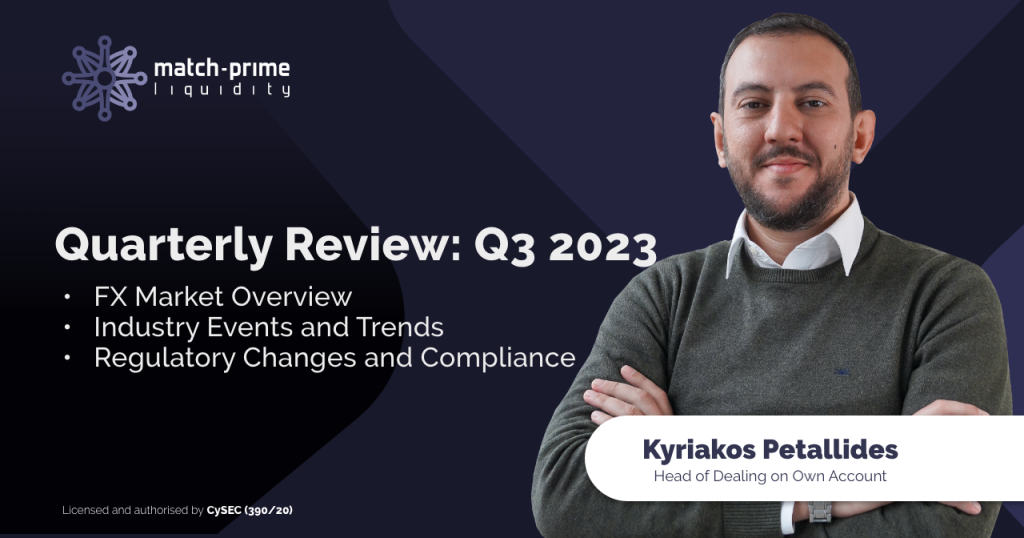
Introduction
As October is coming to an end, we are back with our cyclical FX quarterly review. Entering the third quarter of 2023, investor confidence—in the absence of a recession this year—grew substantially. It was driven by a robust job market and sustained consumer spending.
However, the positive outlook comes with caution for both the stock and bond markets. Despite the ongoing signs of potential relief from inflationary pressures, the anticipated aggressive rate cuts scheduled for 2024 now seem less likely. This shift in market dynamics triggered a retreat among the dominant seven biggest stocks that had been propelling most of the market’s gains. In contrast, value stocks, including dividend-paying assets, displayed better performance during this period. Furthermore, energy stocks emerged as the top performers, benefitting from a significant upturn in oil prices.
We divided this FX quarterly review into three categories: an FX market overview, industry events and trends, and regulatory changes. Read on to find out all the relevant details.
I. Foreign Exchange (FX) Market Overview
The US dollar (USD) saw a sustained strengthening trend in Q3, marking an impressive 11-week advance, which is the second longest in over 50 years. This growth was primarily driven by the Federal Reserve’s steadfast commitment to maintaining higher interest rates.
Despite the European Central Bank’s efforts to combat inflation through a series of rate hikes, the euro (EUR) faced a decline of -3.06% against the USD in Q3. Similarly, the British pound (GBP) continued its slide against the USD with a -3.88% decrease during the same period, influenced by a weakening economic outlook.
Interest Rates
The next section of our FX quarterly review deals with interest rates. In July, the US Federal Reserve raised interest rates by 0.25%, emphasising its commitment to data-driven decisions for future rate adjustments. Over the past 18 months, the Fed has been taking proactive measures to address the historically high inflation rates by increasing short-term interest rates. While the economic outlook remains uncertain, both the Fed and investors closely monitored economic data to gain insights into potential policy shifts and market conditions.
Global Equity Market
The stock market had a solid year overall, but it experienced a decline in the third quarter. The S&P 500, after a nearly 5% drop in September, saw a 3.3% decline for the quarter, primarily due to rising interest rates. It’s worth noting that September tends to be a historically weak month for market performance.
Despite a challenging quarter, Nasdaq has maintained strong year-to-date performance, with a return of 27.1%. This surpasses the returns of both the S&P 500 and the Russell 1000, which have each returned around 13% for the year.
Global Fixed Income
Concurrently, government bonds saw a decline as yields ascended. Notably, commodities, particularly in the energy sector, outperformed other assets, driven by increased demand resulting from oil production cuts by Saudi Arabia and Russia.
II. Industry Events and Trends
New T+1 Settlement Cycle Brings FX Settlement Risks (July)
Let’s move on to the next section of our FX quarterly review: events and trends. The new T+1 settlement cycle, which will be implemented by 28 May 2024, requires trades to be settled in one day, which poses challenges for FX traders.
The increased risk of FX settlement risk may be mitigated by outsourcing currency management or investing in technology. The new settlement cycle will also pose challenges for settling trades across time zones. Firms will need to develop new operational processes to meet the tight deadlines of the new settlement cycle. Some experts believe that technology can help firms meet tight deadlines, while others emphasise the importance of collaboration.
Match-Prime Becomes the Official Sponsor of Omonoia FC for the New Season (August)
Here’s the part of our FX quarterly review we especially like. Match-Prime Liquidity and Omonoia FC have renewed their sponsorship agreement for the 2023/2024 season. This extension builds upon the partnership established the previous year, during which Match-Prime Liquidity’s logo was featured on Omonoia’s official match kit.
Andreas Kapsos, CEO of Match-Prime, expressed his excitement about the sponsorship and Omonoia’s success, noting the club’s 75th anniversary and rich history. Omonoia FC, founded in 1948, is a well-known football team in Cyprus with numerous National Championships and Cups wins. Christos Hadjisoteriou, Omonoia FC’s signatory manager, emphasised the positive collaboration and looked forward to another successful year with Match-Prime Liquidity.
Goldman Sachs Joins Eurex’s FX Liquidity Hub (September)
Goldman Sachs has become a member of Eurex’s FX liquidity hub. This will allow Eurex to offer more liquidity and better pricing. Goldman Sachs’ involvement will also bring global expertise and attract new clients.
SEC’s Intensified Probe into WhatsApp Usage by Wall Street (September)
The US Securities and Exchange Commission (SEC) is intensifying its investigation into the use of private messaging apps like WhatsApp and Signal by Wall Street. They have collected thousands of staff messages from major investment companies, shifting their focus from broker-dealers to investment advisers.
The targeted firms include Carlyle Group, Apollo Global Management, KKR & Co, TPG, and Blackstone. This increased scrutiny has raised concerns about privacy and compliance within the industry. While the investigation doesn’t prove wrongdoing, it highlights compliance issues. The SEC is also interested in private fund fees, conflicts of interest, and preferential treatment of investors.
III. Regulatory Changes and Compliance
Forex Brokers Fined by Regulators
Let’s start the compliance part of our FX quarterly review with fines. In August 2023, the Cyprus Securities and Exchange Commission (CySEC) fined several forex brokers for failing to comply with anti-money laundering (AML) regulations. The fines totalled over €1 million. In September 2023, the Financial Conduct Authority (FCA) fined another forex broker for failing to comply with AML regulations.
ESMA Highlights Areas for Improvement in Firms’ Disclosure of Cost and Charges
ESMA has highlighted the areas for improvement in firms’ disclosure of costs and charges under MIFID II. While most firms comply with these requirements, there are inconsistencies in disclosure formats, variations in the quality and timing of information provided, and a lack of disclosure in areas like inducements and implicit costs. ESMA plans to work on new Q&As and a possible standardised EU format for cost and charges information. National Competent Authorities (NCAs) will address regulatory breaches and other issues where needed.
ESMA Analysis of the Cross-Border Investment Activity of Firms
On July 19, 2023, ESMA and national competent authorities (NCAs) conducted an analysis of the cross-border provision of investment services in 2022.
The key findings were:
- About 380 firms provided cross-border investment services to retail clients, with 59% being investment firms and 41% credit institutions.
- Approximately 7.6 million clients in the EU/EEA received investment services from firms located in other Member States.
- Cyprus was the primary location for firms offering cross-border investment services, followed by Luxembourg and Germany.
- More than 75% of EU/EEA retail clients receiving cross-border services were served by firms in Cyprus, Germany, and Sweden.
- The average number of cross-border retail clients per firm ranged from 189 to about 140,000, with an overall average of 19,000 clients per firm.
- Germany, Spain, France, and Italy were significant destinations for investment firms providing cross-border services.
- Around 5,700 complaints were recorded by firms regarding cross-border investment services, with most complaints related to contract terms/fees/charges and general admin/customer services.
- ESMA plans to continue this annual data collection exercise and publish a report on its findings in 2024. The analysis emphasises the need for NCAs to intensify supervision and cooperation in the cross-border provision of financial services.
ESMA Report on Sanctions and Measures Imposed under MIFID II in 2022
On July 7, 2023, ESMA published a report summarising sanctions and measures imposed under the MIFID II framework in 2022. The report reveals that while the total number of sanctions and measures imposed by National Competent Authorities (NCAs) decreased compared to the previous year, the number of Member States applying these measures and the total amount of administrative fines increased in 2022. However, ESMA cautions that the higher total fine amount is partly due to a few NCAs imposing substantial fines.
The decrease in the total number of NCAs’ sanctions and measures may be attributed to a more consistent understanding of enforcement and sanctioning powers among NCAs, aided by ESMA’s efforts to harmonise the concept of sanctions and measures. In 25 out of 30 EU/EEA Member States, NCAs imposed a total of 281 sanctions and measures with a combined value of EUR 21,034,117
That’s it, Q3 2023 summarized! If you enjoyed our FX quarterly review, take a look at the summaries of Q2 and Q1 2023.


